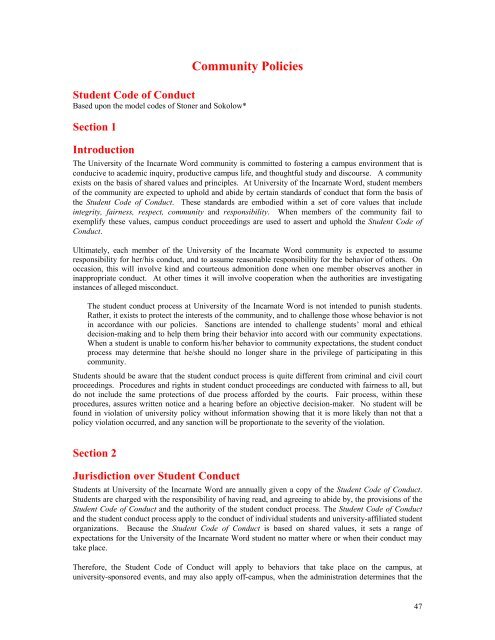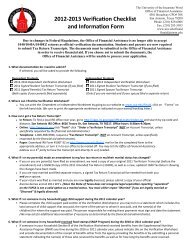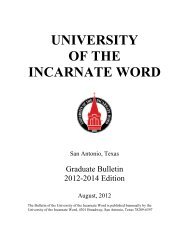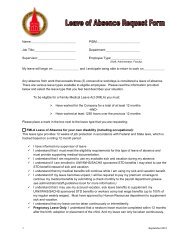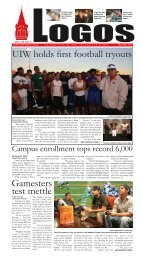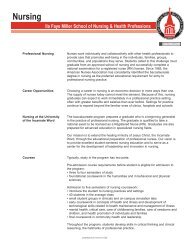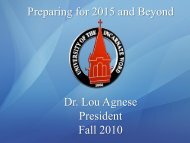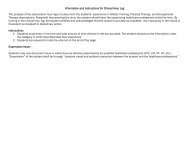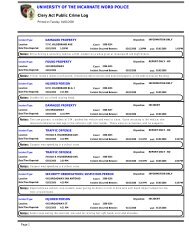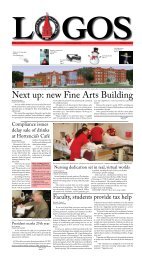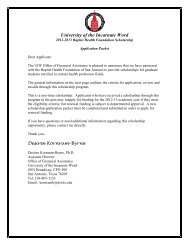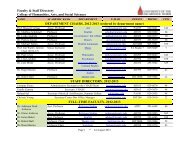2006-2007 Student Handbook - University of the Incarnate Word
2006-2007 Student Handbook - University of the Incarnate Word
2006-2007 Student Handbook - University of the Incarnate Word
You also want an ePaper? Increase the reach of your titles
YUMPU automatically turns print PDFs into web optimized ePapers that Google loves.
Community Policies<strong>Student</strong> Code <strong>of</strong> ConductBased upon <strong>the</strong> model codes <strong>of</strong> Stoner and Sokolow*Section 1IntroductionThe <strong>University</strong> <strong>of</strong> <strong>the</strong> <strong>Incarnate</strong> <strong>Word</strong> community is committed to fostering a campus environment that isconducive to academic inquiry, productive campus life, and thoughtful study and discourse. A communityexists on <strong>the</strong> basis <strong>of</strong> shared values and principles. At <strong>University</strong> <strong>of</strong> <strong>the</strong> <strong>Incarnate</strong> <strong>Word</strong>, student members<strong>of</strong> <strong>the</strong> community are expected to uphold and abide by certain standards <strong>of</strong> conduct that form <strong>the</strong> basis <strong>of</strong><strong>the</strong> <strong>Student</strong> Code <strong>of</strong> Conduct. These standards are embodied within a set <strong>of</strong> core values that includeintegrity, fairness, respect, community and responsibility. When members <strong>of</strong> <strong>the</strong> community fail toexemplify <strong>the</strong>se values, campus conduct proceedings are used to assert and uphold <strong>the</strong> <strong>Student</strong> Code <strong>of</strong>Conduct.Ultimately, each member <strong>of</strong> <strong>the</strong> <strong>University</strong> <strong>of</strong> <strong>the</strong> <strong>Incarnate</strong> <strong>Word</strong> community is expected to assumeresponsibility for her/his conduct, and to assume reasonable responsibility for <strong>the</strong> behavior <strong>of</strong> o<strong>the</strong>rs. Onoccasion, this will involve kind and courteous admonition done when one member observes ano<strong>the</strong>r ininappropriate conduct. At o<strong>the</strong>r times it will involve cooperation when <strong>the</strong> authorities are investigatinginstances <strong>of</strong> alleged misconduct.The student conduct process at <strong>University</strong> <strong>of</strong> <strong>the</strong> <strong>Incarnate</strong> <strong>Word</strong> is not intended to punish students.Ra<strong>the</strong>r, it exists to protect <strong>the</strong> interests <strong>of</strong> <strong>the</strong> community, and to challenge those whose behavior is notin accordance with our policies. Sanctions are intended to challenge students’ moral and ethicaldecision-making and to help <strong>the</strong>m bring <strong>the</strong>ir behavior into accord with our community expectations.When a student is unable to conform his/her behavior to community expectations, <strong>the</strong> student conductprocess may determine that he/she should no longer share in <strong>the</strong> privilege <strong>of</strong> participating in thiscommunity.<strong>Student</strong>s should be aware that <strong>the</strong> student conduct process is quite different from criminal and civil courtproceedings. Procedures and rights in student conduct proceedings are conducted with fairness to all, butdo not include <strong>the</strong> same protections <strong>of</strong> due process afforded by <strong>the</strong> courts. Fair process, within <strong>the</strong>seprocedures, assures written notice and a hearing before an objective decision-maker. No student will befound in violation <strong>of</strong> university policy without information showing that it is more likely than not that apolicy violation occurred, and any sanction will be proportionate to <strong>the</strong> severity <strong>of</strong> <strong>the</strong> violation.Section 2Jurisdiction over <strong>Student</strong> Conduct<strong>Student</strong>s at <strong>University</strong> <strong>of</strong> <strong>the</strong> <strong>Incarnate</strong> <strong>Word</strong> are annually given a copy <strong>of</strong> <strong>the</strong> <strong>Student</strong> Code <strong>of</strong> Conduct.<strong>Student</strong>s are charged with <strong>the</strong> responsibility <strong>of</strong> having read, and agreeing to abide by, <strong>the</strong> provisions <strong>of</strong> <strong>the</strong><strong>Student</strong> Code <strong>of</strong> Conduct and <strong>the</strong> authority <strong>of</strong> <strong>the</strong> student conduct process. The <strong>Student</strong> Code <strong>of</strong> Conductand <strong>the</strong> student conduct process apply to <strong>the</strong> conduct <strong>of</strong> individual students and university-affiliated studentorganizations. Because <strong>the</strong> <strong>Student</strong> Code <strong>of</strong> Conduct is based on shared values, it sets a range <strong>of</strong>expectations for <strong>the</strong> <strong>University</strong> <strong>of</strong> <strong>the</strong> <strong>Incarnate</strong> <strong>Word</strong> student no matter where or when <strong>the</strong>ir conduct maytake place.Therefore, <strong>the</strong> <strong>Student</strong> Code <strong>of</strong> Conduct will apply to behaviors that take place on <strong>the</strong> campus, atuniversity-sponsored events, and may also apply <strong>of</strong>f-campus, when <strong>the</strong> administration determines that <strong>the</strong>47


